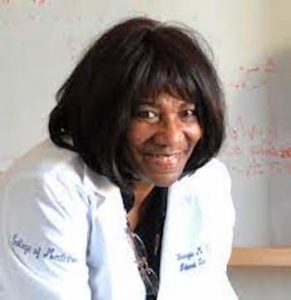
Georgia Dunston
*Georgia Dunston was born on this date in 1944. She is a Black scientist and professor of human immunogenetics.
Georgia Mae Dunston was born to a hard-working Black family in Norfolk, Virginia. Her parents did not attend college but instead worked various commercial jobs. Ulysses, her father, was a cook at a commercial barbecue wholesaler, and Rosa, her mother, worked as a cleaner, presser, and dishwasher. While growing up, Dunston attended the local Baptist church and Sunday school. Close to graduating High school, Dunston was unsure about going to college; she became interested in Human Biology and decided to continue her scientific education.
Dunston graduated in the top tier of her class and earned a full scholarship to Norfolk State University. Dunston received a B.S. in Biology from Norfolk State University and then, after being granted a Carver Research Fellowship, gained an M.S. degree in Biology at Tuskegee University. Dunston used paper Chromatography and Electrophoresis to study biochemical differences in DNA in pigeons for her master's thesis. David Aminoff, now an Emeritus Professor at the University of Michigan, who taught Georgia biochemistry at Tuskegee, was very impressed with her work ethic and performance and aided her in gaining funding for a doctorate in human genetics. In 1972, Dunston earned a Ph.D. in human genetics at the University of Michigan, Ann Arbor. Among other things, she found that the Xh and Pa 1 antigens are identical and that they could be isotypic markers. Additionally, she found that anti-Xh was reactive in the sera of Old and New World monkeys but not of Prosimian or lesser mammals, concluding that the isotypic specificity among the higher mammals arose during the speciation process.
Career
After attaining her doctorate in 1972, Dr. Dunston took up a position as an associate professor on the faculty of the microbiology department at Howard University. In 1975–1976, Dunston undertook a postdoctoral fellowship at the National Cancer Institute, alongside her faculty position, focusing on tumor immunology. During this time, Dunston consulted for the Job Corps Sickle Cell Anemia Program for the U. S. Department of Labor, the Cancer Coordinating Council for Metropolitan Washington, the National Institute of Environmental Health Sciences, and the Genetic Basis of Disease Review Committee. Dunston's Associate professorship ended in 1978. In 1982, funded by the National Institutes of Health (NIH), Dunston was appointed a scientist at the National Cancer Institute Laboratory of Immunodiagnostics.
There she specialized in the immunogenetic characteristics of human killer cells. Three years later, Dunston was allowed to direct the Human Immunogenetics Laboratory. During this stage of her career, she was interested in genetic variations in human major histocompatibility complex (MHC) genes and antigens and their relations with the disease in African Americans. Improvements in understanding these genes and antigens could aid the difficulties of receiving organ transplants for blacks while also shedding light on their role in general immunological processes. Between 1988 and 1989, Dunston was the co-principal investigator of an NIAID grant to further work on transplantation for Native and African Americans, particularly in histocompatibility testing of transplantation antigens.
From 1991 to 1994, Dunston acted as associate director of the Division of Basic Sciences at Howard University Cancer Center. During this time, she contributed to a special report on organ donation for the Black community. In the mid-1990s, Dunston was among the first researchers to join the then-new Visiting Investigator's Program (VIP) at the National Human Genome Research Institute. She collaborated with the then director who led the Human Genome Project, publishing work on the genetics of type 2 diabetes in West Africa.
In 2001, the partnership between Howard University and the NIH Office of Research on Minority Health provided the foundations for the National Human Genome Center (NHGC). Dunston founded and directed the NHGC with an "unprecedented leadership" team at Howard University. Dunston and her team at the NHGC and Howard University built a national and international research collaboration focusing on the genetics of diseases common in African Americans and other African diaspora populations. As a full professor at Howard University, Dunston and her group's current research is centered on exploiting the power of population diversity in quantifying the information content of the human genome.